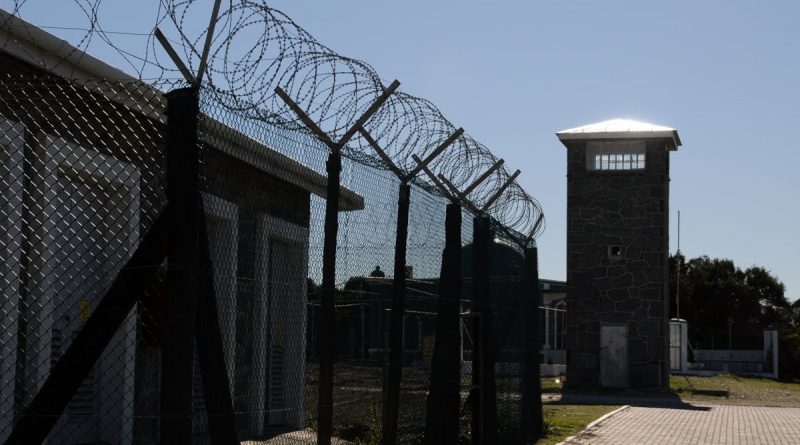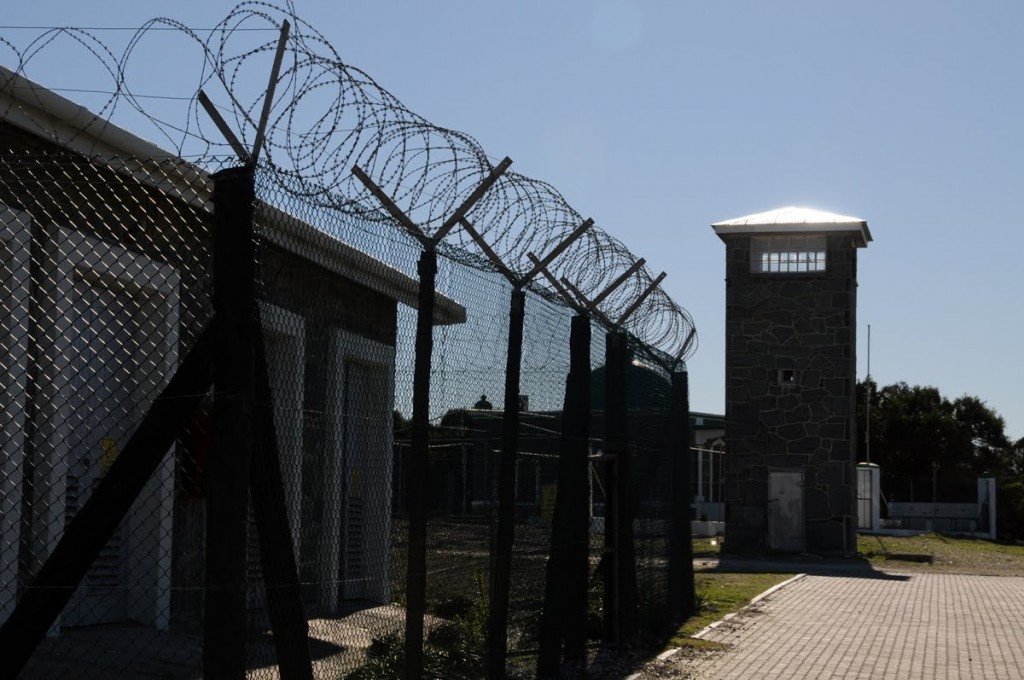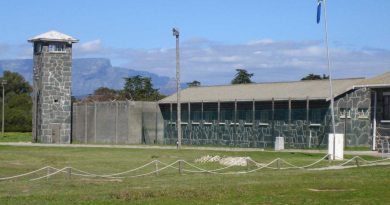Minister Ndebele addresses parliament on Mangaung Private Correctional Facility
Address by the Minister, Mr. Sibusiso Ndebele, MP
Correctional Services Portfolio Committee Meeting
National Assembly, Cape Town
5th November 2013
Ø Chairperson of the Portfolio Committee on Correctional Services: Mr. Vincent Smith
Ø Other Members of the Portfolio Committee
Ø Acting National Commissioner of the Department of Correctional Services: Ms. Nontsikelelo Jolingana
Ø DCS Senior Management
Ø Members of the Media
The National Development Plan demands of all of us to work hard towards ensuring the reconstruction, and development, of our country. As the Department of Correctional Services (DCS), our hands are on deck. Globally, there is a shift towards viewing imprisonment as punishment in itself – and not for punishment. The objective of Corrections is to re-engineer a new person, who becomes a responsible citizen.
APPOINTMENT OF ACTING NATIONAL COMMISSIONER
On 9th September 2013, we appointed the Chief Operating Officer of DCS, Ms Nontsikelelo Jolingana, as acting National Commissioner. This followed the retirement of the National Commissioner, Mr. Thomas Moyane, as per stipulation of the Correctional Services Act. This vacant position will be advertised in the coming weeks, and will be filled in line with applicable legislative, and policy, procedures.
Section 95(5) of the Correctional Services Act (Act 111 of 1998) provides that the retirement of Correctional Officials is regulated by the Correctional Services Act, Act No. 8 of 1959. Section 12, of Act 8 of 1959, provides for the retirement, resignation or discharge of Correctional Officials as follows:
“(2) Subject to the provisions of this section, a correctional official shall have the right to retire and shall be retired on pension –
(a) on the day on which he attains the age of sixty years, if he retains that age on the first day of any month in the year;
(b) on the first day of the month immediately following the month in which he attains the age of sixty years, if he attains that age after the first day of any month of the year.”
From April 2012 to August 2013, in line with this Act, 280 Correctional Officials retired. This Section of this Act has been in operation for more than 50 years.
The only exception was the former homelands, for instance Transkei, where the compulsory retirement age was 55 years.
With regards to the vacant positions of Chief Financial Officer and Chief Deputy Commissioner: Strategic Management, interviews will take place in the coming weeks.
Honourable Members, in respect of the suspension of the CEO of the Judicial Inspectorate of Correctional Services on 12th September 2013, due to the sub-judice rule, we are not at liberty to divulge much regarding the allegations of wrongdoing. The allegations were submitted to the Portfolio Committee as reported by the Public Protector. An investigation is currently underway by DCS.
Section 88A (1) of the Correctional Services Act, Act 111 of 1988, states: “The Inspecting Judge must identify a suitably qualified and experienced person as Chief Executive Officer….”.
Section 88A(4) states: “Any matters relating to misconduct and incapacity of the Chief Executive Officer must be referred to the National Commissioner by the Inspecting Judge”.
2014 ELECTIONS
The Freedom Charter, adopted in 1955, clearly states that imprisonment shall not be for vengeance, but shall aim at re-education. In the clause, ‘The people Shall Govern,’ it is stated that, “Every man and woman shall have the right to vote and to stand as a candidate for all bodies which make the laws; ALL people shall be entitled to take part in the administration of the country; The rights of the people shall be the same, regardless of race, colour or sex”.
>From 1994 to date, inmates have been voting. The matter in respect of local government was settled by the Constitutional Court in 1999. This Saturday and Sunday (9th and 10th November), the Independent Electoral Commission (IEC) will facilitate voter registration ahead of the 2014 polls. Just like we held free, and fair, elections in 2009, we will also contribute towards credible elections next year for all inmates as well as officials on duty. DCS has a clear policy about how voter education, and elections, should be conducted at our security, and rehabilitation centres. We are ready for the 2014 elections.
ACCESS TO EDUCATION
As the IEC prepares for elections over the next few months, DCS will also be busy ensuring that all inmates are in possession of the necessary documentation to register for relevant educational programmes. Section 41 of the Correctional Services Act, Act 111 of 1998, states as follows:
“(1) The Department must provide or give access to as full a range of programmes and activities, including needs-based programmes, as is practicable to meet the educational and training needs of sentenced offenders.
(2) (a) Sentenced offenders who are illiterate or children must be compelled to take part in the educational programmes offered in terms of subsection (1).”
In this regard, we wish the thousands of offenders well, at various levels of their education, who are preparing, and sitting, for exams at this time of year. We have learners at Adult Education and Training (AET) level, matric as well as those pursuing diplomas, higher diplomas, degrees and higher degrees. Last year (2012) in the National Senior Certificate examinations, inmates achieved a 79,25% pass rate compared to 68,06% in 2011. The best performing Correctional Centre School was Johannesburg Correctional Centre School which achieved a 94,11% pass rate, followed by Usethubeni Youth School (Westville, KwaZulu-Natal) which achieved an 81,48% pass rate. Honourable Members, earlier this year we announced that, from 1st April 2013, it is compulsory for every inmate, without a qualification equivalent to Grade 9, to complete AET level 1 to 4. To date, more than 11 649 inmates are participating in AET programmes in correctional centres across the country. Inmates assisting in these programmes also receive a gratuity.
Proper identification is also necessary for our health care delivery, in accordance with National Health Guidelines, Norms and Standards. Together with the Department of Health, DCS participated in the development of a successful proposal for a Global Fund to fight HIV, STIs, TB and malaria. To effectively manage tuberculosis in correctional centres, GeneXpert machines are now available at Baviaanspoort, Tshwane, Upington, Durban Westville and Pollsmoor.
MANGAUNG PRIVATE CORRECTIONAL CENTRE
Next Tuesday (12th November), we will be meeting with the Bloemfontein Corrections Consortium (BCC) who is responsible for the Mangaung Private Correctional Centre (MCC). As you are all aware, the safety, and security, situation at the Mangaung Correctional Centre has remained under public scrutiny for a while. The relationship between DCS and BCC is governed by a Concession Contract, which details services to be rendered, as well as minimum compliance requirements, in fulfillment of the contract. We want to ensure compliance in terms of the law and contract, and there are consequences for any breach of contract. In July 2016, as per the contract, ownership of these facilities will revert to the State.
Subsequent to our written communication to the Chairperson of the Portfolio Committee on 18th September, on 9th October, DCS invoked Section 112 of the Correctional Services Act with regards to the management of MCC operated by G4S. Section 112 states: (a) “If in the opinion of the National Commissioner in consultation with the Minister: –
i. The Director has lost, or is likely to lose, effective control of a public-private partnership correctional centre or any part of it; and
ii. If it is necessary, in the interest of safety and security to take control of such correctional centre or part of it,
He or she may appoint a Temporary Manager to act as the head of that correctional centre and may replace custody officials with correctional officials to the extent necessary.”
Gauteng Regional Commissioner, Mr. ZI Modise, is currently overseeing the facility at Mangaung. Various countries, including Canada and Britain, utilize private companies to manage correctional facilities. In 2000, government entered into a public-private partnership to construct, maintain and manage the Mangaung facility. This PPP experiment seems to be showing that the desired results are not being realized, and DCS will continue to engage all affected parties.
On 25th October, following reports of allegations of offenders at MCC being forcibly injected with antipsychotic medication, and electroshocks being used to subdue and control offenders, we immediately ordered an investigation into this matter. The investigation included the appointment of a medical team. As per the Geneva Convention, cruel treatment and torture of inmates, including outrages upon personal dignity, in particular, humiliating and degrading treatment, should not be tolerated.
PAROLE
Honourable members, parole is an internationally accepted mechanism that allows for the conditional release of offenders from correctional centres, into the community, prior to the expiry of their entire sentence of imprisonment. As you know, more and more offenders are approaching the courts with regards to their parole applications. Through our parole system, we are able:
• To afford an offender a second chance in life to become a law abiding citizen;
• To minimise the probability of re-offending, by ensuring gradual integration back into the community under controlled circumstances; and
• To provide an opportunity to continue with rehabilitation programmes in the community.
During 2012/13, the number of parolees without violations increased from 78.5% to 84.89%. There are also several success cases of offenders who were released on parole and became successful law-abiding citizens. These include:
• Offender Kgabje who was sentenced to 15 years for robbery. He enrolled for a LLB degree, and completed it in 2012. He has been offered an opportunity to be a tutor of law students at the University of the North West.
• Offender Fanie Manganyi who, attended ABET training while incarcerated, is now an ABET Facilitator at a mining company.
• Offender Gcobani Mayoyo served three years imprisonment, and achieved A-symbols in Mathematics, Biology, Economics and Business Economics and B-symbols in English and isiXhosa. He was awarded a full bursary to study at an educational institution of his choice, just a week after being released on parole.
The implementation of the new Act (Act 111 of 1998), during 2004, has brought a new dimension to the release policy of the Department. The most significant changes, regarding the release of offenders on correctional supervision, or parole placement, is enhancing the role of the community in decision-making, and the opportunities granted to victims of crime to express their views before any decision is made by a Correctional Supervision and Parole Board (CSPB). The protection of the community should be fundamental – the release of the offender should not have a negative impact on the community.
On 23rd February 2012, the new Medical Parole Advisory Board (MPAB) was announced to assist in processing medical parole applications.
The new medical parole system differs from the previous one in that an offender, or someone acting on the offender’s behalf, is, from 1st March 2012, able to bring an application for release on medical parole.
Before 1st March 2012, only the medical practitioner treating the offender could apply. Apart from terminally ill inmates, the net is thrown wider to include physically incapacitated inmates and those suffering from an illness that severely limits their daily activity or self-care. From 1st March 2012 to 2nd October 2013, the MPAB dealt with applications as follows:
– Applications received: 235
– Positive recommendations for release: 56
– Recommendations not to release: 154
The Victim-Offender Dialogues (VOD) aim to strengthen the current rehabilitation, and reintegration, programmes of the department. It places the victim at the centre of the corrections process. Various Victim Offender Mediation, and VOD, sessions were held in this regard. The release policy encourages victim empowerment as a basic right of the victim. The Criminal Procedure Act makes provision for a victim to attend a CSPB hearing, or to make written representations to the CSPB. The victim may request to have certain stipulations included in an offender’s parole conditions, especially in rape and child abuse cases. The participation of victims has increased from 253 in 2010/11 to 1 215 in 2012/13. In the 1st quarter of 2013/14, 344 victims participated in CSPB sessions against a target of 265.
MINISTERIAL TASK TEAM
The Ministerial Task Team was established on 11th February 2013, following a Ministerial Consultative Forum with recognised Trade Union partners – POPCRU and PSA. The task team, comprising of four representatives from Management, POPCRU and PSA, was mandated to tackle a range of issues in order to facilitate a sound labour-management relationship within the Department. The forum resolved that the task team would resolve all issues before 15th March 2013. However, it soon became clear that, given the enormity of the task at hand, it was necessary to set aside more time. An extension to 15th June 2013 was granted. It was also made clear that this intervention was in no way designed to replace the existing Departmental Bargaining Chamber (DBC), but rather an instrument to remove barriers that existed in the DBC.
Accordingly, the forum also resolved that the DBC, and other relevant structures, would remain to fulfil their necessary mandates. The Task Team met on the following dates: 7-8th March 2013; 14th March 2013; 19th April 2013; 13th May 2013; 17th May 2013; 10th June 2013; 14th June 2013; 8th August 2013 and 28th October 2013. To date, the Ministerial Task Team managed to resolve the following issues:
q Payment of outstanding Pay Progression less three percent [3%];
q Payment of Pay Progression for Social Workers;
q Extension of Educator Labour Relations Council Resolution 4 of 2009 to Educators in DCS;
q Payment of Merit Awards to qualifying officials;
q Absorption of Learners into entry-level positions within DCS;
q Training of Control Room Operators;
q Payment of Overtime for Nurses;
q Leave management;
q Establishment of a process to resolve the Housing Allowance issue;
q Privatisation and Outsourcing;
q The non-implementation of agreements, for example the memorandum of Understanding [Settlement Agreement of 2005];
q Removal of factors that affect the success of the Relationship By Objectives [RBO];
q Establishment of a process to resolve the issue of shift patterns and the safety of members; and
q Payment and Translation of Group 1 Learners to correct notches (Ring-fenced students of 2008).
CONCLUSION
Finally, next Monday (11th November), in another first towards ensuring that all people in South Africa are, and feel, safe, we will be publicly demonstrating our Electronic Monitoring Control Room at our Head Office in Pretoria. As part of this ground-breaking initiative, we are now able to monitor, and communicate with, offenders, who are electronically monitored, 24-hours-a-day, 7-days-a-week. DCS is hard at work with its officials, offenders, social partners and the public in transforming our country and deepening democracy.





